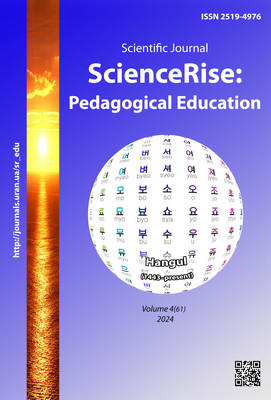Model of formation of innovative competence of students of basic general secondary education in the process of learning physics
DOI:
https://doi.org/10.15587/2519-4984.2024.319432Keywords:
modeling, key competencies, psychological and pedagogical conditions, STEM, innovative competence, educational processAbstract
The formation of innovative competence in students during the process of learning physics has become a promising strategic direction for the development of physical education. Based on the results of the analysis of scientific psychological and pedagogical literature, current educational practices for preparing students of basic general secondary education, and trends in its development, the need to update the content of physical education in the context of forming innovative competence and mastering the scientific and pedagogical experience of its formulation in the conditions of the New Ukrainian School has been identified.
The article highlights the process of creating a model for forming innovative competence in students of basic general secondary education during physics learning: it clarifies the essence of modeling as a means of scientific cognition and identifies the peculiarities of creating a pedagogical model; the foundational principles for developing the model of innovative competence formation in students during physics education are outlined; the content of the main blocks of the developed model is defined.
The psychological and pedagogical conditions for the implementation of the developed model are indicated: stimulating positive and productive motivation for students to master physical education; considering the achievements of science, technological developments, and labor market requirements in the content of education; involving students in research, project, and interactive activities in line with educational standards, curricula, and educational programs; actively using modern pedagogical approaches to teaching and assessment, innovations in the education sector, interdisciplinary teaching practices, methods and tools that promote the development of students’ research and inventiveness competencies; organizing the educational process as a pedagogical interaction, aimed at the development of the individual and their preparation for solving life tasks of varying complexity
References
- Pro skhvalennia Kontseptsii realizatsii derzhavnoi polityky u sferi reformuvannia zahalnoi serednoi osvity «Nova ukrainska shkola» na period do 2029 roku (2016). Rozporiadzhennia Kabinetu Ministriv Ukrainy No. 988. 14.12.2016. Available at: https://zakon.rada.gov.ua/laws/show/988-2016-р#Text
- Pro osvitu (2017). Zakon Ukrainy No. 38-39. 05.09.2017. Available at: http://zakon.rada.gov.ua/laws/show/2145-19
- Kozubovska, I. V., Povidaichyk, O. S. (2021). Korotkyi tlumachnyi slovnyk psykholoho-pedahohichnykh terminiv. Uzhhorod: Uzhhorodskyi natsionalnyi universytet, 41.
- Antonova, O. Ye. (2014). Slovnyk bazovykh poniat z kursu «Pedahohika». Zhytomyr: Vyd-vo ZhDU imeni Ivana Franka, 100.
- Burhun, I. V. (2015) Teoretyko-metodychni zasady rozvytku navchalno-piznavalnykh kompetentsii uchniv osnovnoi shkoly v navchanni fizyky [Extended abstract of Doctoral thesis; Natsionalnyi pedahohichnyi universytet imeni M. P. Drahomanova].
- Bibik, H. V. (2010) Mizhpredmetni zviazky matematyky i fizyky yak zasib formuvannia kliuchovykh kompetentnostei uchniv osnovnoi shkoly. [Extended abstract of PhD thesis; Khersonskyi derzhavnyi universytet].
- Pinchuk, O. P. (2011). Formuvannia predmetnykh kompetentnostei uchniv osnovnoi shkoly v protsesi navchannia fizyky zasobamy multymediinykh tekhnolohii [Extended abstract of PhD thesis; Natsionalnyi pedahohichnyi universytet imeni M. P. Drahomanova].
- Medina Coronado, D., Muñoz Vargas, B. R., Ninamango Santos, N. J., García Gutiérrez, E. R. (2024). Invisible learning in the investigative competence of Lima schoolchildren. Journal of Infrastructure, Policy and Development, 8 (13), 9289. https://doi.org/10.24294/jipd9289
- Sari, F. P., Prasetyo, H., Kuswanto, H. (2020). Physics Comics Learning Media Based on Engklek Traditional Games on Parabolic Motion Topics to Improve Creativity. Journal of Gifted Education and Creativity, 7 (2), 83–92. Available at: https://dergipark.org.tr/tr/download/article-file/1037371
- Dare, E. A., Ellis, J. A., Roehrig, G. H. (2014). Driven by Beliefs: Understanding Challenges Physical Science Teachers Face When Integrating Engineering and Physics. Journal of Pre-College Engineering Education Research (J-PEER), 4 (2). https://doi.org/10.7771/2157-9288.1098
- Juškaite, L. (2019). The impact of the virtual laboratory on the physics learning process. society. integration. education. Proceedings of the International Scientific Conference, 5, 159. https://doi.org/10.17770/sie2019vol5.3804
- Pro povnu zahalnu seredniu osvitu (2020). Zakon Ukrainy No. 463-IKh. 16.01.2020. Available at: https://zakon.rada.gov.ua/laws/show/463-20#Text
- Pro deiaki pytannia derzhavnykh standartiv povnoi zahalnoi serednoi osvity (2020). Postanova Kabinetu Ministriv Ukrainy No. 898. 30.09.2020. Available at: https://www.kmu.gov.ua/npas/pro-deyaki-pitannya-derzhavnih-standartiv-povnoyi-zagalnoyi-serednoyi-osviti-i300920-898
- Pro skhvalennia Kontseptsii rozvytku pryrodnycho-matematychnoi osvity (STEM-osvity) (2020). Rozporiadzhennia Kabinetu Ministriv Ukrainy No. 960-r. 5.08.2020. Available at: https://zakon.rada.gov.ua/laws/show/960-2020-%D1%80#Text
Downloads
Published
How to Cite
Issue
Section
License
Copyright (c) 2024 Viktoriіa Bondarenko, Olena Kryvylova

This work is licensed under a Creative Commons Attribution 4.0 International License.
Our journal abides by the Creative Commons CC BY copyright rights and permissions for open access journals.
Authors, who are published in this journal, agree to the following conditions:
1. The authors reserve the right to authorship of the work and pass the first publication right of this work to the journal under the terms of a Creative Commons CC BY, which allows others to freely distribute the published research with the obligatory reference to the authors of the original work and the first publication of the work in this journal.
2. The authors have the right to conclude separate supplement agreements that relate to non-exclusive work distribution in the form in which it has been published by the journal (for example, to upload the work to the online storage of the journal or publish it as part of a monograph), provided that the reference to the first publication of the work in this journal is included.








